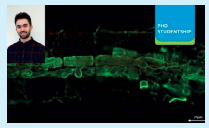
In this article, Jason Pole explores the crop-friendly fungi focus of one of our crop PhD studentship projects, funded by AHDB Cereals & Oilseeds
If your crop roots are in good nick, there’s a decent chance they’ve cuddled up with some potentially powerful soil allies: arbuscular mycorrhizal fungi (AMF). The word ‘mycorrhiza’ stems from two Greek words: mykos and rhiza, which mean ‘fungus’ and ‘root’, respectively. Unlike fungal pathogens, which infect and damage plants, AMF form symbiotic relationships with roots – in a healthy game of give and take
AHDB PhD student George Crane has developed a fascination for AMF, which are ubiquitous in nature. AMF colonise root cells, undergo intense branching and form ‘arbuscules’ – sites for fungus–plant metabolite exchange and nutrient accumulation.
Based at NIAB, George leads on a series of field-scale trials and glasshouse experiments that aim to tap into the potential of AMF for crop production.

As part of a UK soil assessment programme, the effect of common farm practices on AMF diversity and abundance has already been examined. For example, deep cultivations influenced AMF species composition, with disrupted soils potentially hosting fewer beneficial species.
Cover crops, which deliver various benefits to farming systems, can also promote AMF. This aspect is under investigation in two fully replicated trials in Norfolk (Bawburgh and Morley). Various cover crop species are being tested – sometimes with a helping hand in the form of commercially produced AMF inoculum (five species).
The study has also linked with Innovative Farmers (IF) too, to apply these findings at the farm scale. The research is providing a steer for onfarm trials at six sites that use cover crops and anaerobic digestate (AD) to influence AMF. So far, all trials have delivered mixed results. However, longterm use of cover crops is most likely to deliver a positive effect on AMF communities.
The work has also refined the use of targeted primers that amplify specific AMF DNA. Such molecular approaches can help detect the presence of fungal species in soil samples. For example, George’s work has confirmed the presence of 87 AMF taxa in the UK soil assessment samples, which will now be further investigated.

With UK farming under increasing pressure to demonstrate its sustainability, AMF provides another great opportunity to harness and work with nature. The PhD, which receives part funding through the AgriFood Charities Partnership (AFCP), is due to conclude next year.
For more information:
